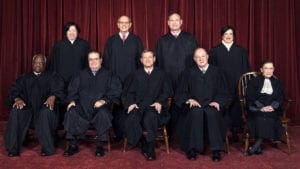Supreme Court Upholds Illegal Searches Prompted by the War on Drugs
This article was featured in our weekly newsletter, the Liberator Online. To receive it in your inbox, sign up here.
When discussing the ongoing surveillance programs run by the US government’s National Security Agency (NSA) in 2013, Dr. Ron Paul said that “the Fourth Amendment is clear; it says we should be secure in our persons, houses, papers and effects, and that all warrants must have probable cause.” But while Dr. No from Texas has always been a consistent defender of liberty, few other members of any of the branches of government can say they take the task of upholding the US Constitution seriously. Recently, yet another powerful group in Washington joined Congress and the Executive branch by using its political power to ravage the 4th Amendment: the Supreme Court.
 In a 5 to 3 ruling of the Utah v. Strieff case, the Supreme Court decided that police officers are allowed to stop anyone without probable cause, going against restrictions imposed by the 4th Amendment of the Constitution. What TechDirt calls “bogus traffic stops predicated on nonexistent laws” is now protected thanks to the Supreme Court, causing the reach of these same stops to be expanded to individuals on foot as well.
In a 5 to 3 ruling of the Utah v. Strieff case, the Supreme Court decided that police officers are allowed to stop anyone without probable cause, going against restrictions imposed by the 4th Amendment of the Constitution. What TechDirt calls “bogus traffic stops predicated on nonexistent laws” is now protected thanks to the Supreme Court, causing the reach of these same stops to be expanded to individuals on foot as well.
But while this decision is damaging because it expands the police’s unchecked powers, the factors that prompted the stop that led to this case in the first place are being widely ignored.
In 2006, the Salt Lake City policy received an anonymous tip concerning a drug activity hotspot. An officer was sent to monitor said hotspot, noticing that, for several days, the house in question received a high volume of foot traffic. One of the individuals seen entering and leaving the property was Edward Strieff, who was stopped by an officer while on his way to a convenience store.
During the so-called routine check after he encounter, police found Strieff had an outstanding “small traffic warrant,” prompting the officer to arrest him and search him. That’s when the officer found a bag of methamphetamine, as well as drug paraphernalia, in his pockets.
What prompted the unconstitutional stop, and then search, wasn’t just due to police abuse. Instead, the drug war was what prompted the anonymous caller to reach out to law enforcement, and before that, what prompted the black market to provide Salt Lake City customers with the products they wanted.
According to TechDirt, the evidence found on Strieff should have been suppressed in court since the officer stopped the individual without probable cause. The state of Utah had already conceded to that much, but once it decided the case should be appealed, Utah v. Strieff made it to the highest court in America, where the justices decided that the “fruits of the illegal search” should remain unsuppressed. To TechDirt writers, this decision gives the government precedent, giving law enforcement agencies across the land even more expanded powers than they had before.
Instead of keeping Americans safe, the war on drugs has produced yet another unintended consequence, destroying our 4th Amendment protections and putting the lives of innocent individuals in danger in the face of police abuse. Isn’t that the opposite of keeping us safe?

























